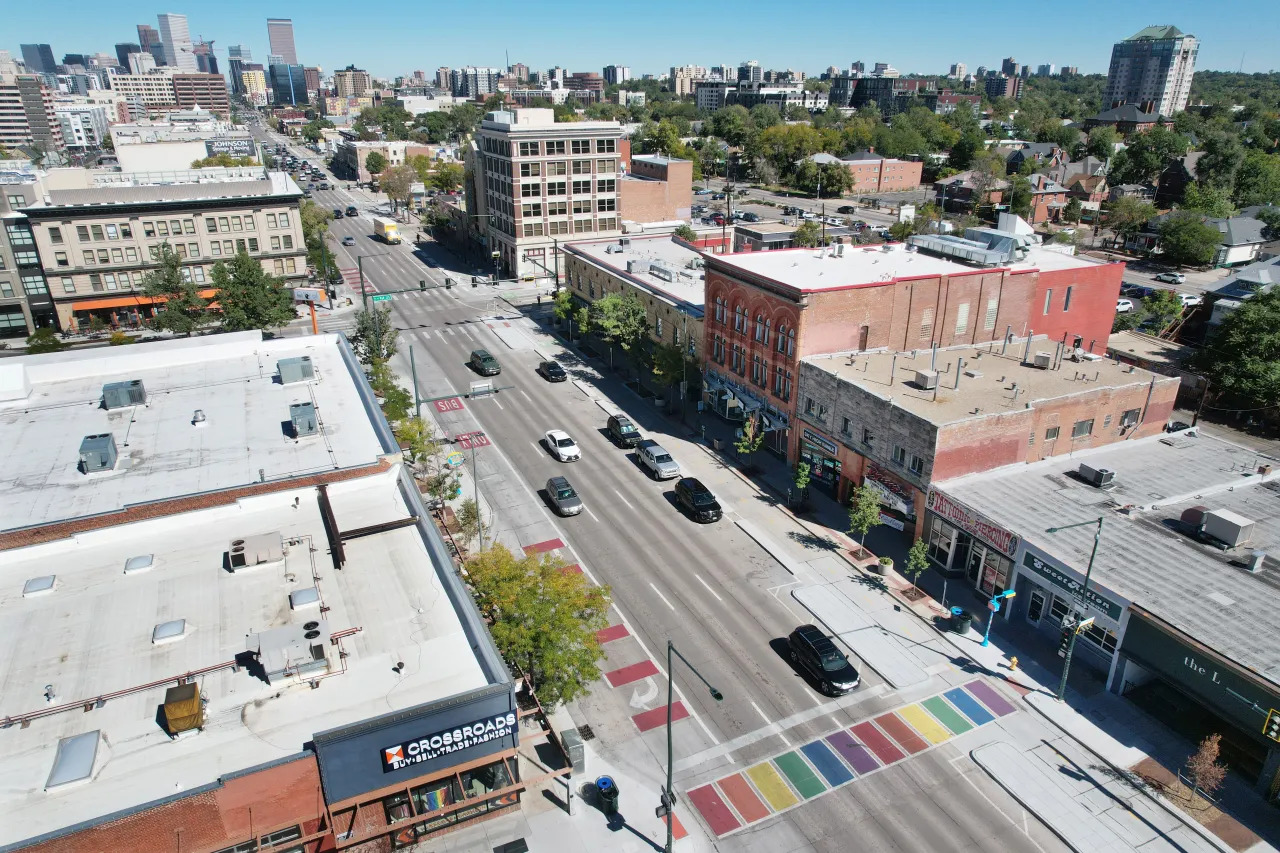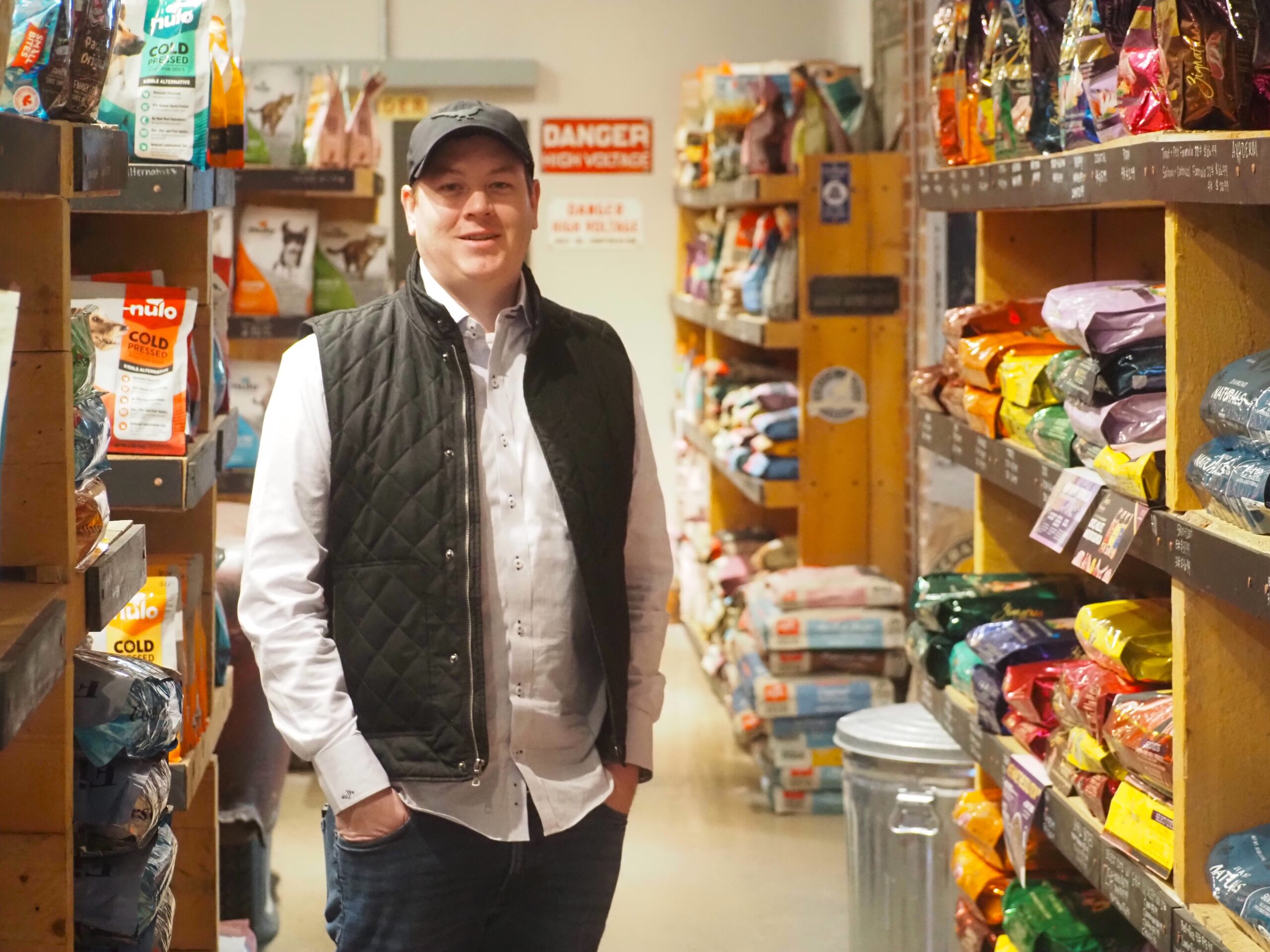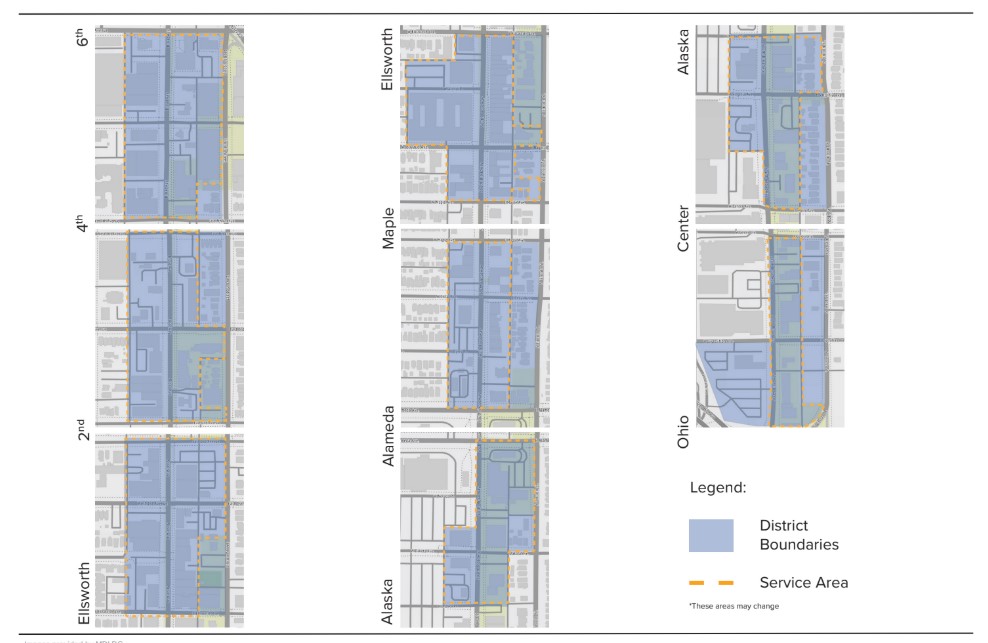
The Broadway business district in Denver on Wednesday, Sept. 25, 2024. (Hyoung Chang/The Denver Post)
Those that live or own property along Broadway in central Denver could be asked whether to impose an additional tax on themselves this coming November.
That’s the target date for a vote on whether to establish a “general improvement district” for the stretch of the road between 6th Avenue and Interstate 25.
The proposed district, for which some business and property owners are advocating for, would use the funds to provide additional services in three main categories: security, maintenance and marketing.
The mill levy — at one point floated to be set at 21, or $21 per $1,000 of assessed property value — is now expected to fall somewhere in the eight to nine range.
Luke Johnson, founder of Luke & Company Fine Pet Supply at 530 Broadway, said the idea for the district grew out of discussions in the Broadway Merchants Association, a group of business owners along the corridor that helps put on events such as the annual Halloween parade.
“People constantly complained … What are we doing to keep the streets cleaner and safer?” Johnson said.
The answer was not much, because the association was funded only by optional donations from active members. It didn’t have the steady stream of dollars necessary to enter into contract with, say, a private security firm.

Luke Johnson owns Luke & Company Fine Pet Supply at 530 N. Broadway in Denver. He’s a proponent of the general improvement district. (Thomas Gounley/BusinessDen)
The situation along Broadway, which is not far from downtown and has long had a homeless presence, got rougher coming out of the pandemic, Johnson said.
“It’s definitely largely COVID-triggered,” he said. “I think Broadway’s always been an eclectic mix of people, but it’s gotten worse after COVID.”
For a while, Johnson and other proponents pursued a “business improvement district,” or BID, which if enacted would have taxed owners of commercial properties within the designated area. They submitted an application to establish the district to the city last year, requesting the aforementioned mill levy of 21.
But the group, with the aid of Denver-based consultant Jamie Giellis, recently made two major changes. First, they dropped the proposed mill levy, which Giellis — who has helped establish tax districts both in Denver and elsewhere — called “extremely high.”
“The five-to-10 range is always where I start,” she said.
Second, the group changed its request for a BID to a request for a GID. Under the latter, owners of residential property are also assessed the additional taxes.
Historically, the stretch of Broadway has been home to smaller buildings consisting largely of retail or restaurant space. Giellis said the change to a GID reflects the fact that Broadway is seeing “a trend toward higher-density development with mixed-uses” when it comes to new development — i.e., bigger projects that often include lots of apartments and some retail space.
Those residents will benefit from the services the district provides, Giellis said, so it’s reasonable for them to help pay for it.
“Safety is clearly the highest priority we’ve heard from everybody,” she said.

Maps submitted to the city last year showing, in blue, properties that would make up the proposed district. Broadway is the north-south street at the center. (Public records)
The proposed GID is still early in the process, so some numbers are still being crunched. But Giellis said the new proposed mill levy could translate to about $1.3 million coming in the first year.
That’s in line with a new GID in Denver’s Ballpark neighborhood, which voters there approved this past November. It, too, was born largely out of a desire to improve safety.
Also like Ballpark, the Broadway GID would replace three existing “local maintenance districts” that provide some services to parts of the 6th-to-I-25 stretch.
Johnson started his pet shop in 2016. It’s always been on Broadway. In December 2023, he moved to his current location, a barn-shaped building that he developed himself. He said he expects to pay about $45,000 in annual property taxes when Denver’s assessor values his property this coming cycle.
In his case, a mill around nine would add another $4,000 in taxes that would go to the proposed GID, Johnson said.
Not everyone is on board. One block to the south of Johnson’s business is Metropolitan Framing, which offers custom framing and art restoration services. Andrew Stemple founded the business in 1990 and moved to 424 N. Broadway in 2012.

Andrew Stemple owns Metropolitan Framing at 424 N. Broadway in Denver. He opposes the general improvement district. (Thomas Gounley/BusinessDen)
Stemple has been active in the Broadway Merchants Association and was initially part of discussions to form a special district. But he stepped away when, prior to Giellis’ involvement, the proposed mill levy seemed to creep up and up.
“Those early meetings started at eight mills, then up to 12, to 17, then after I left it got up to 21. That equates, for me, to $8,500 a year,” Stemple said.
Even with the mill levy dropping to eight or nine, Stemple said he’ll still be a no vote. It’ll increase rents along the street, he noted — most commercial leases have tenants paying a landlord’s taxes — which could make it harder to fill vacancies.
“We need to get further into the new administration’s economy; if it weakens, the BID tax could devastate small businesses and property owners, if it gets stronger the spaces should fill up organically,” said Stemple, speaking before learning of the change from a BID to a GID.
Stemple also said his stretch of Broadway doesn’t really need the help.
“If you go to 2nd Avenue and go south, I think they need all the help they can get,” he said. “They need 80 percent of the services. And that’s where the model’s broken.”
Stemple said it’s also somewhat disappointing to need to set up a special district to pay for security when Denver residents and businesses are already paying taxes to fund a police department.
“My perspective on the security is they can’t do anything,” he said. “They can have a presence.”
Johnson acknowledged that it seems cities are “turning into quilts of improvement districts of some type.” But he believes Mayor Mike Johnston is working to improve things, and that others need to take steps too.
“There is a sense of duty,” he said. “We can improve our community. We just have to figure out the way to do it
“We can’t solve homelessness in Denver on Broadway. And we know that.”
Giellis said the reality is, both in Denver and elsewhere, the police departments are struggling with staffing and thus focused on responding to crimes.
“That’s a very different thing from taking a proactive approach to preventing crime on your street,” she said.
A key next step for the GID effort will be collecting signatures. It’ll need at least 200 from potential voters within the district. The Denver City Council would then need to vote to put the question on the November ballot.
The ballot question would be put to those who own commercial or residential property within the district’s boundaries, as well as registered voters who live in the district but rent their unit.
The district would include most properties on both sides of Broadway within the stretch, although it would not include Broadway Park at the corner of Broadway and Alameda, which already has services through a metro district. The boundaries also include properties on the west side of Lincoln Street.

Elsa Vossler, left, and her friend Reeve Jacob read books at Mutiny Information Cafe at 2 S. Broadway in Denver on Sept. 21, 2024. The business has since moved. (Helen H. Richardson/The Denver Post)
The stretch has gotten attention in recent months as a handful of well-known tenants have left, including the bookstore Mutiny Information Cafe. Johnson said there’s “a lot of factors” that have contributed to that, and that the stretch has rents remaining relatively affordable compared to other parts of the city.
The stretch, he said, stands out because it is largely home to small, independent businesses, not chains.
“The vast majority of people, including myself, couldn’t afford to do it in Cherry Creek North. Probably couldn’t do it in RiNo … There’s a lot of beauty in that too.”
Special tax districts in other neighborhoods have faced some pushback in recent months.
In RiNo, where city leaders will soon vote on whether to renew the BID for another 10 years, some property owners want to see it scrapped completely, and others want the mill levy of four cut in half.
Further east, a strip mall owner attempted in December to exit the Colfax Mayfair BID. But the City Council rejected the request.

The Broadway business district in Denver on Wednesday, Sept. 25, 2024. (Hyoung Chang/The Denver Post)
Those that live or own property along Broadway in central Denver could be asked whether to impose an additional tax on themselves this coming November.
That’s the target date for a vote on whether to establish a “general improvement district” for the stretch of the road between 6th Avenue and Interstate 25.
The proposed district, for which some business and property owners are advocating for, would use the funds to provide additional services in three main categories: security, maintenance and marketing.
The mill levy — at one point floated to be set at 21, or $21 per $1,000 of assessed property value — is now expected to fall somewhere in the eight to nine range.
Luke Johnson, founder of Luke & Company Fine Pet Supply at 530 Broadway, said the idea for the district grew out of discussions in the Broadway Merchants Association, a group of business owners along the corridor that helps put on events such as the annual Halloween parade.
“People constantly complained … What are we doing to keep the streets cleaner and safer?” Johnson said.
The answer was not much, because the association was funded only by optional donations from active members. It didn’t have the steady stream of dollars necessary to enter into contract with, say, a private security firm.

Luke Johnson owns Luke & Company Fine Pet Supply at 530 N. Broadway in Denver. He’s a proponent of the general improvement district. (Thomas Gounley/BusinessDen)
The situation along Broadway, which is not far from downtown and has long had a homeless presence, got rougher coming out of the pandemic, Johnson said.
“It’s definitely largely COVID-triggered,” he said. “I think Broadway’s always been an eclectic mix of people, but it’s gotten worse after COVID.”
For a while, Johnson and other proponents pursued a “business improvement district,” or BID, which if enacted would have taxed owners of commercial properties within the designated area. They submitted an application to establish the district to the city last year, requesting the aforementioned mill levy of 21.
But the group, with the aid of Denver-based consultant Jamie Giellis, recently made two major changes. First, they dropped the proposed mill levy, which Giellis — who has helped establish tax districts both in Denver and elsewhere — called “extremely high.”
“The five-to-10 range is always where I start,” she said.
Second, the group changed its request for a BID to a request for a GID. Under the latter, owners of residential property are also assessed the additional taxes.
Historically, the stretch of Broadway has been home to smaller buildings consisting largely of retail or restaurant space. Giellis said the change to a GID reflects the fact that Broadway is seeing “a trend toward higher-density development with mixed-uses” when it comes to new development — i.e., bigger projects that often include lots of apartments and some retail space.
Those residents will benefit from the services the district provides, Giellis said, so it’s reasonable for them to help pay for it.
“Safety is clearly the highest priority we’ve heard from everybody,” she said.

Maps submitted to the city last year showing, in blue, properties that would make up the proposed district. Broadway is the north-south street at the center. (Public records)
The proposed GID is still early in the process, so some numbers are still being crunched. But Giellis said the new proposed mill levy could translate to about $1.3 million coming in the first year.
That’s in line with a new GID in Denver’s Ballpark neighborhood, which voters there approved this past November. It, too, was born largely out of a desire to improve safety.
Also like Ballpark, the Broadway GID would replace three existing “local maintenance districts” that provide some services to parts of the 6th-to-I-25 stretch.
Johnson started his pet shop in 2016. It’s always been on Broadway. In December 2023, he moved to his current location, a barn-shaped building that he developed himself. He said he expects to pay about $45,000 in annual property taxes when Denver’s assessor values his property this coming cycle.
In his case, a mill around nine would add another $4,000 in taxes that would go to the proposed GID, Johnson said.
Not everyone is on board. One block to the south of Johnson’s business is Metropolitan Framing, which offers custom framing and art restoration services. Andrew Stemple founded the business in 1990 and moved to 424 N. Broadway in 2012.

Andrew Stemple owns Metropolitan Framing at 424 N. Broadway in Denver. He opposes the general improvement district. (Thomas Gounley/BusinessDen)
Stemple has been active in the Broadway Merchants Association and was initially part of discussions to form a special district. But he stepped away when, prior to Giellis’ involvement, the proposed mill levy seemed to creep up and up.
“Those early meetings started at eight mills, then up to 12, to 17, then after I left it got up to 21. That equates, for me, to $8,500 a year,” Stemple said.
Even with the mill levy dropping to eight or nine, Stemple said he’ll still be a no vote. It’ll increase rents along the street, he noted — most commercial leases have tenants paying a landlord’s taxes — which could make it harder to fill vacancies.
“We need to get further into the new administration’s economy; if it weakens, the BID tax could devastate small businesses and property owners, if it gets stronger the spaces should fill up organically,” said Stemple, speaking before learning of the change from a BID to a GID.
Stemple also said his stretch of Broadway doesn’t really need the help.
“If you go to 2nd Avenue and go south, I think they need all the help they can get,” he said. “They need 80 percent of the services. And that’s where the model’s broken.”
Stemple said it’s also somewhat disappointing to need to set up a special district to pay for security when Denver residents and businesses are already paying taxes to fund a police department.
“My perspective on the security is they can’t do anything,” he said. “They can have a presence.”
Johnson acknowledged that it seems cities are “turning into quilts of improvement districts of some type.” But he believes Mayor Mike Johnston is working to improve things, and that others need to take steps too.
“There is a sense of duty,” he said. “We can improve our community. We just have to figure out the way to do it
“We can’t solve homelessness in Denver on Broadway. And we know that.”
Giellis said the reality is, both in Denver and elsewhere, the police departments are struggling with staffing and thus focused on responding to crimes.
“That’s a very different thing from taking a proactive approach to preventing crime on your street,” she said.
A key next step for the GID effort will be collecting signatures. It’ll need at least 200 from potential voters within the district. The Denver City Council would then need to vote to put the question on the November ballot.
The ballot question would be put to those who own commercial or residential property within the district’s boundaries, as well as registered voters who live in the district but rent their unit.
The district would include most properties on both sides of Broadway within the stretch, although it would not include Broadway Park at the corner of Broadway and Alameda, which already has services through a metro district. The boundaries also include properties on the west side of Lincoln Street.

Elsa Vossler, left, and her friend Reeve Jacob read books at Mutiny Information Cafe at 2 S. Broadway in Denver on Sept. 21, 2024. The business has since moved. (Helen H. Richardson/The Denver Post)
The stretch has gotten attention in recent months as a handful of well-known tenants have left, including the bookstore Mutiny Information Cafe. Johnson said there’s “a lot of factors” that have contributed to that, and that the stretch has rents remaining relatively affordable compared to other parts of the city.
The stretch, he said, stands out because it is largely home to small, independent businesses, not chains.
“The vast majority of people, including myself, couldn’t afford to do it in Cherry Creek North. Probably couldn’t do it in RiNo … There’s a lot of beauty in that too.”
Special tax districts in other neighborhoods have faced some pushback in recent months.
In RiNo, where city leaders will soon vote on whether to renew the BID for another 10 years, some property owners want to see it scrapped completely, and others want the mill levy of four cut in half.
Further east, a strip mall owner attempted in December to exit the Colfax Mayfair BID. But the City Council rejected the request.


